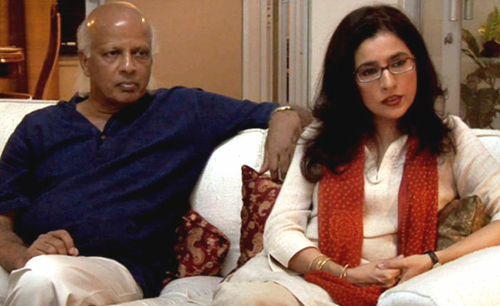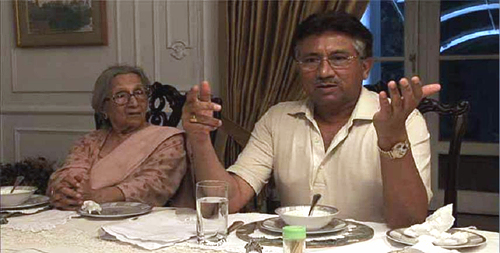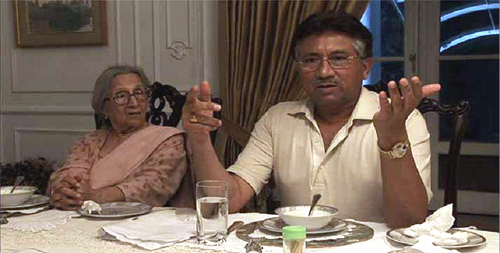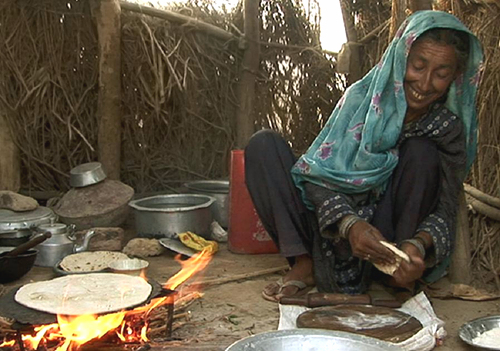10th(2008)
Dinner with the President: a Nation\'s Journey
Sabiha SUMAR
- Pakistan
- 2007
- 82min
- Digi-beta
- color
- Documentary
SYNOPSIS
As we can see from the title, Dinner with the President: a Nation’s Journey is a documentary that filmed various people around Pakistan. The film begins when Musharraf, the present president of Pakistan takes power in October 1999 by enacting a military coup d’etat. Six years later in May 2005, the filmmaker Sabiha Sumar invites President Musharraf to dinner and surprisingly he accepts. The film consists of the scene of dinner with the President and
discussions about women’s rights, Islam, and democracy, which took place on the filmmaker’s journey through Pakistan. She travels around the country meeting the poor and the rich, the liberal and the religious, the young and the old to get their views and experiences of how the country is run and how it is being run. She also talks to the liberal modern Pakistanis, partying on the beach and enjoying life about the Pakistan of today, and questioning for truck drivers without veiling although she is a lslamic. She even has an acrimonious dispute with religious leaders over the topic of women’s rights. The film seems a pilgrimage in search of the answer to the future of Pakistan that Musharraf promised. Is the democracy that the military government promised possible? Sumar, above all, emphasizes the importance of women’s rights, in addition to the abolition of poverty and illiteracy, for the realization of democracy. The documentary straightforwardly shows Pakistan in the collision between religious fundamentalist nationalism and western democracy. (KIM Sunah)
PROGRAM NOTE
As we can see from the title, Dinner with the President: a Nation’s Journey is a documentary that filmed various people around Pakistan. The film begins when Musharraf, the present president of Pakistan takes power in October 1999 by enacting a military coup d’etat. Six years later in May 2005, the filmmaker Sabiha Sumar invites President Musharraf to dinner and surprisingly he accepts. The film consists of the scene of dinner with the President and
discussions about women’s rights, Islam, and democracy, which took place on the filmmaker’s journey through Pakistan. She travels around the country meeting the poor and the rich, the liberal and the religious, the young and the old to get their views and experiences of how the country is run and how it is being run. She also talks to the liberal modern Pakistanis, partying on the beach and enjoying life about the Pakistan of today, and questioning for truck drivers without veiling although she is a lslamic. She even has an acrimonious dispute with religious leaders over the topic of women’s rights. The film seems a pilgrimage in search of the answer to the future of Pakistan that Musharraf promised. Is the democracy that the military government promised possible? Sumar, above all, emphasizes the importance of women’s rights, in addition to the abolition of poverty and illiteracy, for the realization of democracy. The documentary straightforwardly shows Pakistan in the collision between religious fundamentalist nationalism and western democracy. (KIM Sunah)
Director
-

Sabiha SUMARSabiha SUMAR
Born in Karachi, Sabiha Sumar studied Filmmaking and Political Science at Sarah Lawrence College in New York and read History and Political Thought at the University of Cambridge. Her debut documentary Who will Cast the First Stone (1990) won the Golden Tage Award at the San Francisco and her first feature film Silent Waters (2003) won the Golden Leopard for Best Film and the Leopard for Best Actress at the Locarno International Film Festival.
Credit
- ProducerSachithanandam SATHANANTHAN
- Cinematography Claire PIJMAN, Peter BRUGMAN
- Editor Albert ELINGS, Eugenie JANSEN
- Sound Albert ELINGS




